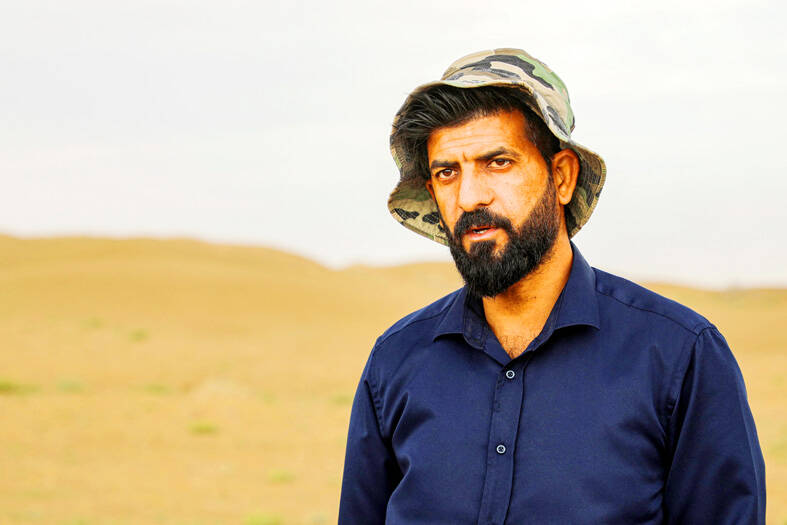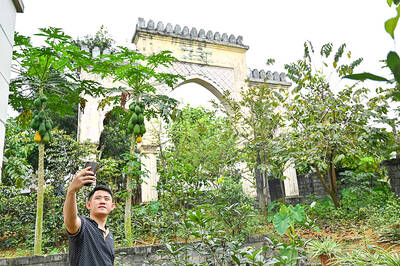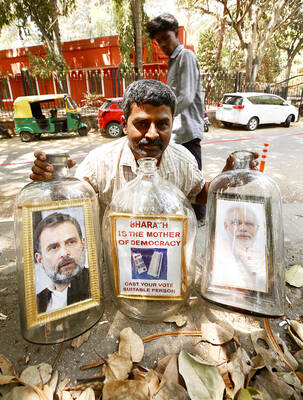Iraqi archeological marvels that have survived millennia and the ravages of war now face a modern threat: being blasted and slowly buried by sandstorms linked to climate change.
Ancient Babylonian treasures, painstakingly unearthed, are slowly disappearing again under wind-blown sand in a land parched by rising heat and prolonged droughts.
Iraq, one of the countries worst-hit by climate change, last year endured a dozen major sandstorms that turned the sky orange, brought daily life to a halt and left its people gasping for air.

Photo: AFP
When the storms clear, layers of fine sand cover everything — including the Sumerian ruins of Umm al-Aqarib, “the Mother of Scorpions,” in the southern desert province of Dhi Qar.
Sandstorms have slowly begun to reverse years of work there to unearth the ancient temples’ terracotta facades and many priceless artifacts, Iraqi State Board of Antiquities and Heriatge researcher Aqeel al-Mansrawi said.
Archeologists in Iraq have always had to shovel sand, but now the volumes are growing.
After a decade of worsening storms, sand at Umm al-Aqarib now “covers a good part of the site,” which dates back to about 2350 BC and spans more than 5km2, he said.
In the past, the biggest threat was looting of antiquities at the ruins, where pottery fragments and clay tablets bearing ancient cuneiform script have been discovered.
Now the changing weather and its impact on the land, especially creeping desertification, spell an additional threat to ancient sites in southern and eastern Iraq, al-Mansrawi said.
“In the next 10 years, it is estimated that sand could have covered 80 to 90 percent of the archeological sites,” he said.
The fabled land between the Tigris and Euphrates rivers hosted some of the world’s earliest civilizations, the remains of which are under threat in modern-day Iraq.
The oil-rich country is still recovering from decades of dictatorship, war and insurgency, and remains plagued by misrule, corruption and widespread poverty.
Compounding its woes, Iraq is also one of the five countries most impacted by some effects of climate change, including drought, the UN says.
Upstream dams in Turkey and Iraq have reduced the flow of its big rivers, and more water is wasted by Iraq’s ancient irrigation system and outdated farming practices.
Summer temperatures topping 50°C now often batter Iraq, where droughts have parched agricultural areas, driving farmers and pastoralists into crowded cities.
“The sandstorms became more frequent, the wind became dustier and the temperatures increase,” said Jaafar al-Jotheri, an archeology professor at the University of Al-Qadisiyah in Al Diwaniyah, Iraq.
“The soil has become more fragile and fragmented because of the lack of vegetation and roots,” he said.
As more farmers flee the countryside, “their land is left behind and abandoned and its soil becomes more exposed to the wind,” he added.
Winds pick up “more sediment fragments that reach the archeological sites,” al-Jotheri said, adding that the “sand and silt cause physical weathering and disintegration of buildings.”
The problem is compounded by salinization, said Mark Altaweel, a professor of Near Eastern archeology at University College London.
During extreme heat, water on the land surface evaporates so quickly that the soil does not reabsorb the crystals, which are left behind as a crust, Altaweel said.
“When it’s hyper dry, the water quickly evaporates and that leaves that salt residue,” he said, adding that “you can see it on the bricks.”
Al-Jotheri said that salt in the earth carried by sandstorms causes “chemical weathering for archeological buildings.”
Iraqi authorities say they are tackling the complex and multilayered problem.
The Iraqi government “is working to contain the sand dunes,” said Chamel Ibrahim, director of antiquities of Dhi Qar province.
He pointed to a plan to plant a “green belt” for about US$3.8 million.
However, al-Jotheri voiced doubt, saying that to keep the vegetation alive, “you need a lot of water.”
When it comes to climate change, “we are the country facing the most and acting the least. We are at the bottom of the list in terms of acting against climate change,” he said.

Le Tuan Binh keeps his Moroccan soldier father’s tombstone at his village home north of Hanoi, a treasured reminder of a man whose community in Vietnam has been largely forgotten. Mzid Ben Ali, or “Mohammed” as Binh calls him, was one of tens of thousands of North Africans who served in the French army as it battled to maintain its colonial rule of Indochina. He fought for France against the Viet Minh independence movement in the 1950s, before leaving the military — as either a defector or a captive — and making a life for himself in Vietnam. “It’s very emotional for me,”

Indian Prime Minister Narendra Modi reaffirmed his pledge to replace India’s religion-based marriage and inheritance laws with a uniform civil code if he returns to office for a third term, a move that some minority groups have opposed. In an interview with the Times of India listing his agenda, Modi said his government would push for making the code a reality. “It is clear that separate laws for communities are detrimental to the health of society,” he said in the interview published yesterday. “We cannot be a nation where one community is progressing with the support of the Constitution while the other

The Chinese Communist Party’s (CCP) Central Committee is to gather in July for a key meeting known as a plenum, the third since the body of elite decisionmakers was elected in 2022, focusing on reforms amid “challenges” at home and complexities broad. Plenums are important events on China’s political calendar that require the attendance of all of the Central Committee, comprising 205 members and 171 alternate members with Chinese President Xi Jinping (習近平) at the helm. The Central Committee typically holds seven plenums between party congresses, which are held once every five years. The current central committee members were elected at the

CODIFYING DISCRIMINATION: Transgender people would be sentenced to three years in prison, while same-sex relations could land a person in jail for more than a decade Iraq’s parliament on Saturday passed a bill criminalizing same-sex relations, which would receive a sentence of up to 15 years in prison, in a move rights groups condemned as an “attack on human rights.” Transgender people would be sentenced to three years’ jail under the amendments to a 1988 anti-prostitution law, which were adopted during a session attended by 170 of 329 lawmakers. A previous draft had proposed capital punishment for same-sex relations, in what campaigners had called a “dangerous” escalation. The new amendments enable courts to sentence people engaging in same-sex relations to 10 to 15 years in prison, according to the